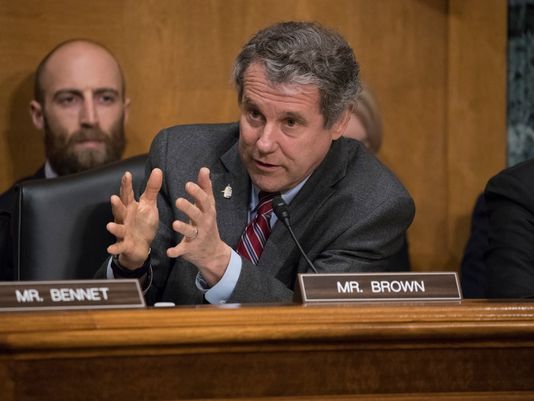WASHINGTON—Sen. Sherrod Brown unveiled a set of populist, pro-worker policies on Friday that he says could strengthen the middle class, increase wages, and serve as a blueprint for Democrats as his party searches for ways to reconnect with working-class voters.
In a speech Friday in Columbus, the Ohio Democrat called for a dramatic shift to the political left on a series of economic and labor issues—including stronger collective bargaining rights for workers, creating a national paid leave fund, and requiring corporate “freeloaders” to reimburse taxpayers if low-wage employees have to rely on federal assistance to make ends meet.
“We need to change the way we think about the American economy,” Brown said in remarks delivered at Ohio State University.
The view that businesses drive the American economy—and that helping corporations by extension help workers—has been “discredited,” Brown argued. “It’s not businesses who drive the economy–it’s workers,” he said.
Brown’s proposals, spelled out in a 77-page proposal full of footnotes and graphics, are not likely to go anywhere in the current Republican-controlled Congress. But his ideas could serve as a rallying point for Democrats as they gear up for the 2018 election, when Brown and others will be on the ballot.
They could also serve as fodder for Brown's GOP opponents, who may seize on his new platform as out of the mainstream. Even before Brown began his speech, a Republican opposition research group attacked it as bad for the economy and a sop to his liberal base.
“By pushing rejected ideas that would eliminate hundreds of thousands of jobs and penalize entrepreneurs, Brown’s proposal is only meant to curry favor to his liberal, special interest donors,” said Jeremy Adler, a spokesman for America Rising Squared, a GOP group that does not disclose its donors.
In a document dubbed “Working Too Hard for Too Little,” Brown broadly calls for changes in four areas:
--Increasing workers’ wages and benefits, including raising the minimum wage to $15 per hour and providing employees with 12 weeks of paid family and medical leave.
--Giving workers greater bargaining power and cracking down businesses that misclassify workers as independent contractors or that deny workers overtime pay.
--Helping workers save for retirement, by offering tax credits to match retirement contributions and expanding retirement programs for part-time and hourly workers.
--Encouraging companies to invest in their workforce by giving them a tax break if they commit to staying in the U.S. and providing good wages and benefits to employees.
"I can accept that the workforce is changing. But what we cannot accept is that more and more of our workers are paid less and have little economic security," Brown said. "We need to update our economic policies, our retirement policies, and our labor laws to reflect today’s reality."
In an interview before the speech, Brown said he began work on the proposal in 2015, well before Trump won the presidency, and he dismissed questions about whether it would serve as his campaign platform as he vies for a third term in the Senate. Brown is expected to face a tough re-election in a state that Trump won by 51 percent of the vote, compared to Democratic nominee Hillary Clinton’s 43 percent.
As he gears up for that race, Brown will have to walk a tightrope—wooing the blue-collar workers who supported Trump while not alienating his own liberal base. But in an interview Thursday, Brown said this was not a political pitch, noting he has long been focused on worker-related issues, such as raising the minimum wage.
“It’s not addressing Trump. It’s not addressing Hillary’s loss,” Brown said. “It’s addressing what we do to empower workers, all workers.”
Still, Brown conceded that his ideas could serve as a roadmap for his own party, as Democrats look for a way out of the political wilderness and come to grips with their stunning 2016 election losses. Brown said he also plans to share his proposal with the White House, noting that Trump won in part because of his populist pitch to working-class voters in Ohio and across the country.
“I hope anybody steals these ideas and moves forward, whether it’s Secretary of Treasury (Steven) Mnuchin or whether it’s Tom Perez,” the newly elected chairman of the Democratic National Committee, Brown said. “I want it talked about. I want people to try to move that agenda.”
Here are some of Brown's specific proposals:
*Require employers to provide workers with a minimum of seven paid sick days;
*Create a national "paid leave fund," paid for via employee and employer payroll contributions, to provide workers with 12 weeks of paid family or medical leave;
*Increase penalties against employers who discriminate against workers trying to form a union or who commit unfair labor practices'
*Require businesses to allow certain part-time workers to participate in the company's retirement plan; and
*Create a "corporate freeloader fee," levied against large corporations who pay poverty-level wages.


